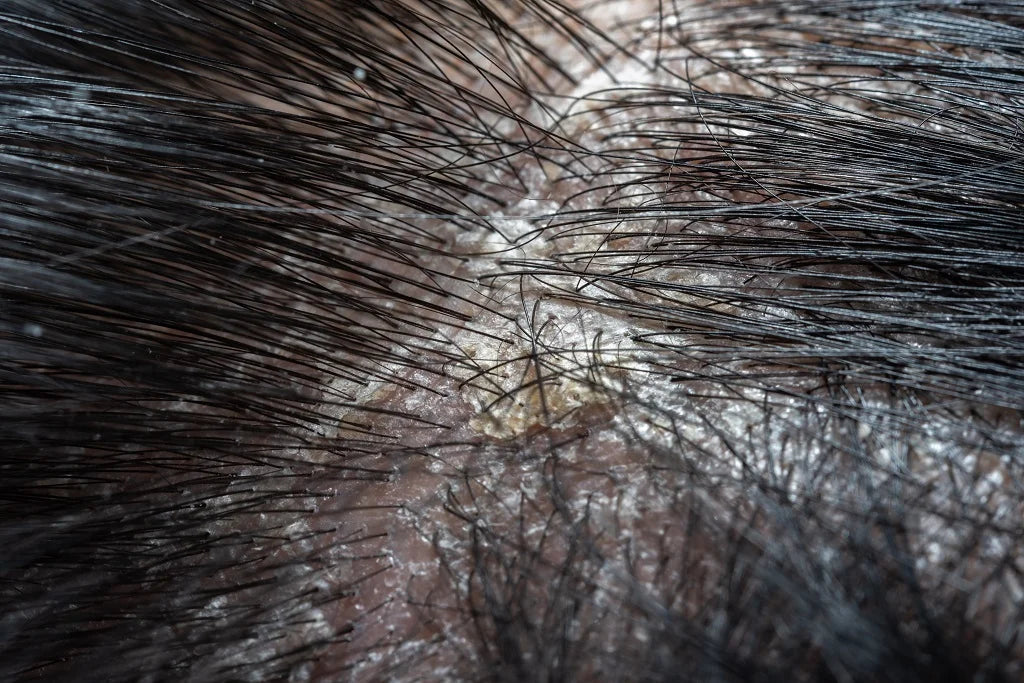
What Is Scalp Peeling?

Dr. Shireen Singh, MBBS.
Written by Our Editorial Team
When it comes down to haircare, many of us focus on maintaining frizz-free, glossy strands while neglecting the scalp. Our scalp plays a key role in maintaining hair health. Unfortunately, the scalp is prone to various infections and scalp conditions, negatively affecting the texture and appearance of your hair. Dryness, itchiness, and dandruff are all common scalp concerns.
Your scalp health is affected by various factors; from environmental factors such as pollution to hormonal imbalance to fungal dandruff. Excessive use of synthetic hair care products to heat styling can strip the natural oil from the scalp resulting in a flaky and itchy scalp. Using products specially formulated for scalp care helps relieve various scalp conditions. A scalp serum In this blog, we will get the low down on common scalp conditions, i.e., scalp peeling.
What Is Scalp Peeling?

Source : Shutterstock
Scalp Peeling refers to eczema of the scalp which causes itching and flaking of the scalp. It leads to a worrying increase in the shedding of your normal skin cells of the scalp. Peeling of the scalp can result in a dry and flaky scalp, which can be very embarrassing. Dandruff, dermatitis, and psoriasis can be the reason for itchy and flaky scalp.
It is crucial to determine what leads to the peeling of the scalp to provide the best possible scalp treatment.
What Are The Different Types Of Scalp Peeling?
The peeling of the scalp in chunks can be due to a dry, itchy scalp and accumulation of dead skin cells. There are different types of scalp peeling, including dandruff, dermatitis, and psoriasis, each of which will be discussed in the next section.
1. Dandruff

Source : Shutterstock
Dandruff is a mild form of seborrheic dermatitis which can lead to itchy and flaky scalp. Small pieces of itchy, dandruff flakes appear on the scalp. Dandruff is a common scalp condition that often appears and disappears. It can be caused either by the overproduction of yeast that thrives on the skin or stress, or poor scalp health.
2. Dermatitis

Source : Shutterstock
The term "dermatitis" is a generic term to describe an inflammatory scalp condition. It is characterized as a red, itchy, and inflamed scalp, which can create a lot of discomfort. Dermatitis is further divided into three main types:
- Atopic Dermatitis: Atopic dermatitis, or eczema, is characterized by itchiness, dryness, and inflammation of the skin. It is commonly associated with allergies and can be triggered due to exposure to harsh haircare products such as shampoos, styling products, or even sweat.
- Contact Dermatitis: It is a type of inflammatory scalp condition that occurs when the scalp's skin comes in contact with allergens such as chemicals and metals. It results in itchy, red, painful rashes, causing blisters and bumps on the scalp.
- Seborrheic Dermatitis: Seborrheic dermatitis is a common skin condition that affects mostly the scalp and facial area. It is characterized by an itchy and inflamed scalp, redness, and flaky, greasy, and yellowish scaling. Yeast infection is considered to be the suspected cause of seborrheic dermatitis.
3. Psoriasis

Source : Shutterstock
Scalp psoriasis results in red, scaly patches on the scalp. It is triggered by the autoimmune system of the body that affects your skin cells. These patches can vary in severity, with or without itching and burning. Psoriasis affects not only the scalp but other parts of the body as well.
How To Treat Scalp Peeling?

Source : Shutterstock
Ensure that your scalp is clean, well-hydrated, and nourished. A healthy, clean scalp facilitates better absorption of hair products, increasing its efficacy and thus providing an optimal environment for healthy hair growth.
If you are looking for an effective scalp peeling treatment, consider using ThriveCo's Scalp care Kit, which consists of Exfoliating Scalp Scrub and Scalp Vitalizing Serum. The supercharged exfoliating scalp scrub is a perfect solution for anyone looking to prevent scalp peeling; dry and itchy scalp condition. This scalp scrub effectively removes dead skin cells, product buildup, and excess sebum production, leaving your scalp feeling refreshed and clean. Regular use of exfoliating scalp scrub provides relief from an itchy, flaky scalp and promotes blood circulation, improving your scalp health.
The Scalp Vitalizing Serum is infused with active ingredients such as Advanced HA, Copper Peptide, and Hesperidin, which work towards restoring the hydration level of your scalp, and have a soothing effect on the inflamed skin, thus revitalizing and rejuvenating your scalp, providing relief from scalp conditions.
Buy ThriveCo Scalp Care Kit
Your haircare routine should start with scalp care, as a healthy scalp is a prerequisite for promoting healthy hair growth. If your scalp condition does not respond to at-home treatment, it is advisable to consult a trichologist who will suggest a better treatment for your scalp condition.
Frequently Asked Questions?
1. What Is An Unhealthy Scalp?
A dry, itchy, and flaky scalp with excessive sebum and product buildup is characterized as an unhealthy scalp.
2. Which Type Of Scalp Is Best?
A clean scalp that is hydrated and well-nourished is the best.
3. Can Stress Make Your Scalp Peel?
Stress and lack of sleep can trigger various scalp conditions, such as dandruff and seborrheic dermatitis.
About Doctor :

Dr. Shireen Singh, MBBS, MD Dermatology, is a trusted dermatologist with over 8 years of specialized experience. Passionate about empowering individuals to achieve their hair and skin care goals, she combines cutting-edge technologies with personalized treatment plans tailored to each individual's needs. She's dedicated to helping you achieve vibrant hair and glowing skin. Dr. Shireen loves research and is here to share her expertise for your health and happiness.
Disclaimer: All the content published on www.thriveco.in is solely for information purposes. It is not a substitute for professional medical advice, diagnosis, or treatment. Always consider seeking the advice of your physician or a qualified healthcare provider. The information, suggestion, or remedies mentioned on this site are provided without warranty of any kind, whether express or implied.
 BUY 1 GET 1 FREE. Use Coupon:BOGO
BUY 1 GET 1 FREE. Use Coupon:BOGO









